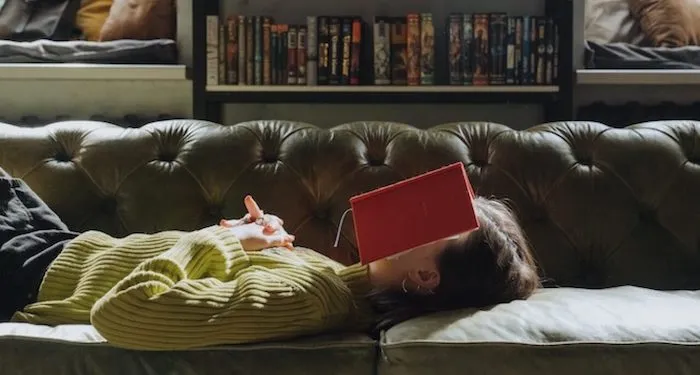
Books Aren’t Mental Movies: You’re Missing the Best Part of Reading
Sometimes, when people describe what they love about reading, it feels like we’re doing two very different activities. They talk about a movie playing out in their mind’s eye as they read, imagined in lush detail. They associate characters with certain actors. It’s like a film you direct yourself, apparently. And that puzzles me, because I don’t picture anything when I read.
I also don’t have much of an internal narrator, so I don’t “hear” anything while I read either, at least most of the time. As a teenager, I broke my subvocalizing habit to try to read faster: I remember reading while pacing around my room and repeating the same word repeatedly aloud, following a guide I found online. It sounds silly, but it worked. Now, I experience books as nothing but language and meaning: no sounds, no images.
When people with aphantasia share their experiences online, they’re often met with pity, especially from readers. I don’t have total aphantasia: I can see shadows and flickers of images, but nothing continuous or vivid, and I usually don’t even get that while I’m reading. Many readers find a lot of joy in being able to vividly imagine the worlds they’re reading about. For some, it’s the reason they read.
The truth is, I don’t envy that at all. I love the way I read. I love being immersed in a completely abstract world of language, emotion, and ideas. It’s unlike anything else I can do in my life. In fact, I struggle to even describe what’s happening in my head as I read. I’m transported, but not to a physical world.
It’s fascinating that readers all have such different experiences with the same activity. For some people, reading is about escape. For others, it’s about learning more about our world. It can be a way to develop empathy. It can be enjoyed through a rich “mental movie” or purely as text. For most people, we read for a variety of reasons. None of these are better or worse ways to experience reading. And yet…
For me, the idea of reading as a mental movie falls completely flat. Even if I could picture the books I read in cinematic imagery, I don’t think I’d want to. For one thing, this has a lot more appeal for certain books, like epic fantasy novels, while for something like a philosophical nonfiction book, I’m not sure how it would translate. Besides, books make for bad movies. There’s a reason book-to-movie adaptations have a script and don’t just act out the entire novel. We look for different things from books and movies.
Most damning, though, is that basing enjoyment of a book on its visuals deprioritizes the strengths of the written word as a medium. Books can do things a movie never could. They are an escape hatch from the prison of our own consciousness: they allow us to be inside the experience of being someone else in a way nothing else can. They let us in on what it feels like inside their mind, to feel the way they do, in an immediacy that’s impossible to replicate in visuals alone.
Then, of course, there’s the best part of reading: ideas and language. While ideas can be communicated through any medium, there’s something about turning over an idea and examining it from every angle that works particularly well in text, and that’s true both of nonfiction and fiction. My favourite part of reading is the ideas it leaves me with: the motifs, the theses. While imagery can contribute to communicating ideas, it’s not as natural and versatile as doing so through text.
Text isn’t there just to be a proxy for visuals. Books are made of language. While I can enjoy books with utilitarian language, they pale next to a story that also has lines that haunt me long after I’ve finished the last page. I love reading because of the beauty of language and how it can change you. Reading only as a means of visualization reduces carefully crafted sentences to cues for mental movie actors.
Admittedly, I may be defensive of my style of reading, since so many readers see it as a lesser way of engaging with books. And I’m sure there are many readers who can balance all of the above: appreciating language while spinning up stunning visuals, mulling over a book’s ideas while mentally pacing its world. It’s hard for me to imagine what the internal experience is like for someone on the hyperphantasia side of the spectrum.
There’s no wrong way to read, and if the joy of books for you is about picturing things like a movie, I’m glad books can do that for you. If you’ve never imagined reading any other way, though, I invite you to close your mind’s eye and imagine reading in a new way: one rooted in language and ideas. Maybe you’ll find something new there.
Chat about it in the comments.
The comments section is moderated according to our community guidelines. Please check them out so we can maintain a safe and supportive community of readers!











Leave a comment
Join All Access to add comments.